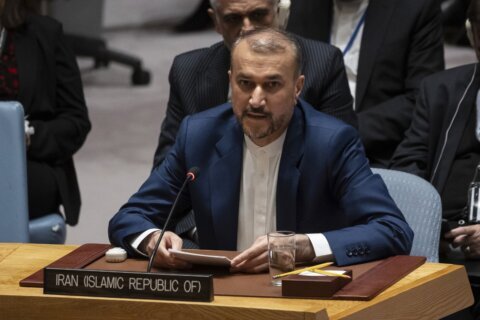CAIRO (AP) — A leading rights group urged Libya’s transitional authorities on Friday to revoke or amend legislation that imposes sweeping restrictions on civil society.
Human Rights Watch issued a statement condemning a 2019 decree that includes “burdensome registration requirements and stringent regulations on funding” of non-governmental organizations in the North African country, which is holding general elections in December.
A Libyan government spokesman could not be immediately reached for comment.
“This decree unjustifiably restricts and muzzles civic organizations working in Libya and is particularly worrisome in view of the need for a robust civil society ahead of planned elections in December,” Hanan Salah, Libya director at HRW said in the statement. “Libyan authorities should urgently come up with regulations that accord with Libya’s obligation to protect freedom of association.”
The decree put a government agency known as the Commission on Civil Society in charge of authorizing new organizations, and controlling their funding and activities. It also allows the agency to revoke their licenses based on a set of vague violations.
Also on Friday, the Libyan Red Crescent reported the disappearance of one of its workers and urged authorities to investigate. Mansour Atte was last seen on Thursday evening outside his organization’s office in the coastal city of Ajdabiya, said the relief agency.
The Defender Center for Human Rights, a Libyan advocacy group, alleged that Atte was kidnapped for his political activism, but there was no official confirmation of that.
Libyans still live under an labyrinth of oppressive laws that date back to the era of longtime dictator Moammar Gadhafi, who was toppled and killed following a NATO-backed uprising in 2011. The legislation continues “to instill fear and seriously impede freedom of association,” HRW added. For example, Libyans may face the death penalty if they are condemned of establishing “unlawful” associations — a crime that the penal code fails to define.
Oil-rich Libya has experienced years of conflict and chaos since Gadhafi’s fall. Until October, it had been split between a U.N.-supported government in Tripoli, and rival authorities based in the country’s east, each backed by armed groups and foreign governments.
A U.N. brokered a cease-fire that has since stopped most of the violence also stipulates that all foreign mercenaries should leave, which still has not taken place. Under the U.N-sponsored roadmap, an interim government was elected in February and entrusted with leading the nation into the general elections in December.
The newly-elected Government of National Unity has received the blessing of the United States and European countries, which have expressed optimism that Libya might be finally on the path to stability and democracy.
The cease-fire deal has dramatically reduced civilian casualties, but the U.N. has continued to document several human rights violations including killings, forced disappearances, sexual violence, arbitrary arrests, hate crimes and attacks against activists and human rights defenders in Libya.
Copyright © 2024 The Associated Press. All rights reserved. This material may not be published, broadcast, written or redistributed.







